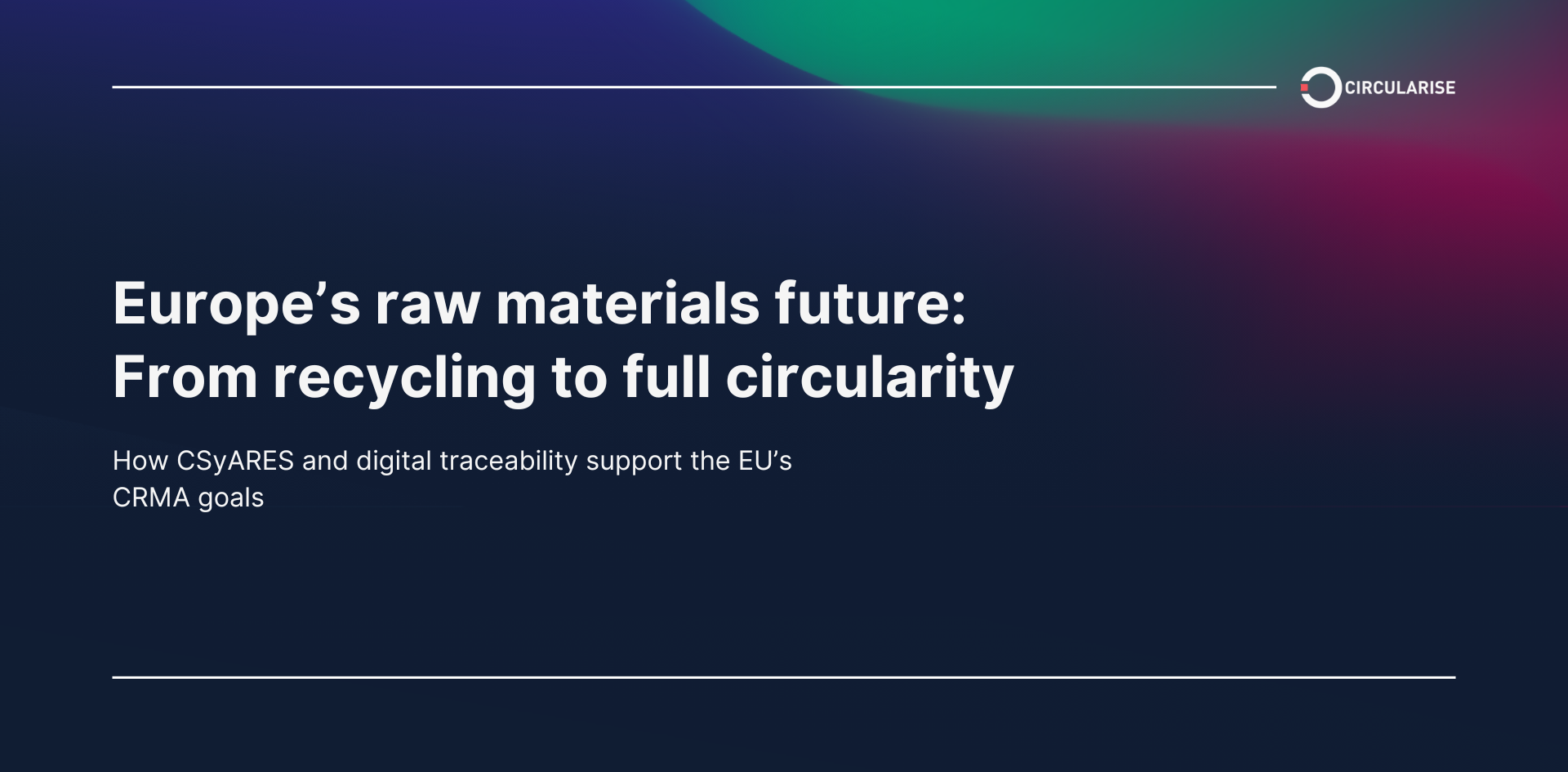This guide explains the steps that you can take for ISCC PLUS certification, with useful advice from Stephan Baltin, ISCC certifier and scheme manager with Control Union Certification Germany, and Pavel Hrubý, Environmental Specialist and Product Service with TÜV SÜD.
The International Sustainability and Carbon Certification (ISCC) is an international certification system for fully traceable supply chains that are environmentally, socially and economically sustainable. It provides a comprehensive set of criteria for assessment and auditing globally to fulfil the United Nations 2030 Agenda for Sustainable Development. Companies that achieve certification under the scheme demonstrate their alignment with sustainability criteria that also:
- Protect diverse and carbon-rich areas
- Support good agricultural practices
- Encourage safe working conditions
- Compliance with human, labour and land rights
- Compliance with laws and international treaties
- Good management practices and continuous improvement
In this article, we explain the importance of certification and share the steps you can take to begin your transition towards a sustainable business. We also spoke to some ISCC PLUS certifiers and auditors to provide you with some insightful advice on getting certified.
Why get ISCC PLUS certified?
Certification is important because it provides assurance that the requirements of regulations and standards are met. This helps to ensure that products are produced in an ethical and responsible manner. Although it is currently voluntary, sustainability certification schemes like ISCC will undoubtedly become an unavoidable condition for businesses to fulfil in the coming years.
Government and industry regulations have already been implemented in response to the climate crisis and growing public attention to sustainability issues – such as the EU Conflict Minerals Regulation, the EU Battery Regulation, the German Supply Chain Act (LkSG), and Corporate Sustainability Reporting Directive (CSRD) just to name a few – with more proposals on the way.
With ISCC PLUS certification along the entire supply chain, you can make credible sustainability claims and prove compliance with regulations. Every element in the supply chain must be covered by the certification, starting from the source materials, feedstocks eligible under ISCC are divided into the following raw material categories:
- Bio
Virgin agricultural raw materials
Examples: Sugar cane, corn, cotton, canola
- Bio-Circular
Waste materials of biological origins
Examples: Forestry residues, straw, tall oil, used cooking oil (UCO)
- Circular (technical)
Waste materials of non-biological origins
Examples: Mixed plastic waste, waste textiles, end-of-life tyres, post-industrial CO2
If you recognise the urgent need to transition your business towards sustainability, then you are probably thinking about getting certified. Before getting started, it is important to understand the requirements of the system and how you can prepare for it. Here are some considerations and a guide to help familiarise you with the ISCC PLUS certification and make the process more manageable.
Guide to getting ISCC PLUS certified


Step 1: Select a Certification Body
Choose from ISCC’s list of recognised Certification Bodies and sign a contract with one that is located in the country where your main operations are headquartered. They can provide advice and guidance throughout the process and will be conducting the requisite audits for the certification.

Step 2: Register directly with ISCC
Register as a user directly with the ISCC registration form.

Step 3: Prepare for audit
Preparation for an audit varies from company to company, and it can be done before or during the certification process. It is useful and even mandatory to conduct an internal audit based on audit procedures before the actual audit. This allows you to identify and complement any missing information from your gap analysis, and make any changes necessary to comply with the standards. Likewise, it is mandatory to conduct a training of all employees responsible for compliance with the standard.

Step 4: Audit conducted by the certification body
Once the training is done and all documentation is ready, you can request an official audit by your certification body. All necessary proof, documents, and access to relevant locations must be provided. If anything is missing or erroneous, you must implement any corrective measure within 40 days.

Step 5: Certificate is issued
The Certification Body has 60 days to issue the certificate after the audit and send all audit documents to both you and ISCC. You will be able to start handling certified material from this point on.

Step 6: Internal Review and approval by ISCC
ISCC officials will conduct an internal review of the audit documents from the Certification Body. If all criteria are met, they will issue the ISCC Plus certification and publish your certificate on their website where all valid certificates can be found.

“Preparation for an initial audit requires the company to get acquainted with the standard requirements and potential risks applicable for their scope, then set up a proper management system, train employees and ensure that everyone is aware of their responsibilities. Collecting all the relevant documentation, such as supplier lists, warehouse lists, and plans to include new material types or scopes – and communicating them well in advance of the audit – also helps a lot with the audit process. ”
How long does the process take?
The preparation and certification process varies depending on each company, the complexity of their processes and operations, and the amount of time and resources they can commit to it. The requirements are clearly defined, but companies should not be afraid about contacting their Certification Body for support and to clarify any uncertainties, and to ask when the next available audit dates are. Ensuring that efficient processes have been set up and employees have been sent for training sooner rather than later can also help speed up the process.

"From the moment of contract signature it can take between a couple of weeks up to several months until a certificate is issued, depending on how fast the company is ready for the audit or the Certification Body can offer capacity. Sometimes companies still need to send employees to trainings and/or to set-up processes, and some companies might require a pre-audit to make sure their system is working well."
Things to look out for getting ISCC PLUS certified
According to Pavel Hrubý from TÜV SÜD, companies often fall short of producing clear records of internal processes regarding mass balancing, such as monitoring how much incoming polymers actually end up in the sustainable products. This leads to unclear or incorrect information indicated in the sustainability declarations issued to the recipients of the products. This is usually an issue in the first year after initial certification when first practical experience is gathered and internal processes adjusted.
Similarly, Stephan Baltin from Control Union Certification Germany noticed that the most common critical issues are related to mistakes in the mass balancing, but also related to the careful checking of the incoming sustainability declarations for the correctness of the claims made by the supplier. Sometimes mistakes are due to human error, such as typos or mixed-up values, while some are more systemic deviations that point to negligent document management or a lack of understanding of the requirements and resulting responsibilities.
What happens when you fail the audit
A failed audit means that the certificate cannot be issued, and ISCC will have to be informed about it. The audit and certification process has to be restarted. However, it is important to note that failed audits do not often occur. Companies have the opportunity to address and close non-conformities within a specific time period, after which the audit would be declared as failed.

“Companies should also not be afraid of contacting the Certifying Body during the year in case of doubt or when mistakes happen. Certification does not mean that one is not allowed to make any mistakes. Open communication with your Certifying Body is extremely important to reduce the probability of severe deviations and to demonstrate honest efforts.”
Maintaining your certification
ISCC Plus certification is not a one-time process. You must maintain your certification by regularly evaluating and documenting your sustainability practices. This ensures that your processes meet the criteria of the certification system and that you remain certified.

“A company getting recertified should make sure that all documents, including declarations issued during the past certification period, are readily available when the auditor comes to audit. The company should also make sure the responsible persons are available on that day.”
How can Circularise support your ISCC PLUS certification
Working closely with the ISCC scheme and ISCC-certified companies such as Asahi Kasei, Arçelik, Borealis, EVBox, Itochu, Marubeni, Neste, Philips Domestic Appliances, Shell, and Trinseo, Circularise proved how digital technologies help increase supply chain traceability and streamline administrative processes, benefitting the entire ISCC PLUS value chain.

During this collaborative project, we developed MassBalancer, an automated solution for mass balance bookkeeping in a scalable, more accurate way. ISCC PLUS sustainability credits are sent in the form of a sustainability declaration that contains all the required information about the sourcing, trading, production, and transport of the material. These sustainability declarations can be easily generated using MassBalancer, keeping a record of transitions and automatically updating the balance of sustainability credits for the quarterly reporting required by ISCC.
With the digital records conducted on the blockchain, the information cannot be altered and sustainability declarations cannot be duplicated. This makes the certifications even stronger as records cannot be tampered with, and sustainability credits cannot be allocated (sent) twice.
Conclusion
Certifications are necessary to ensure the integrity of sustainability claims made by businesses. Our digital blockchain solutions complement certification schemes, helping to strengthen and scale processes through efficient bookkeeping and certificate trading.
By following these steps and using the right tools to help you manage supply chain traceability and prepare sustainability declarations, you can make the process of becoming ISCC Plus certified easier and grow your company sustainably.

Circularise is the leading software platform that provides end-to-end traceability for complex industrial supply chains. We offer two traceability solutions: MassBalancer to automate mass balance bookkeeping and Digital Product Passports for end-to-end batch traceability.
Contact our team to see how MassBalancer can help you efficiently and accurately prepare for getting ISCC PLUS certified


.png)



